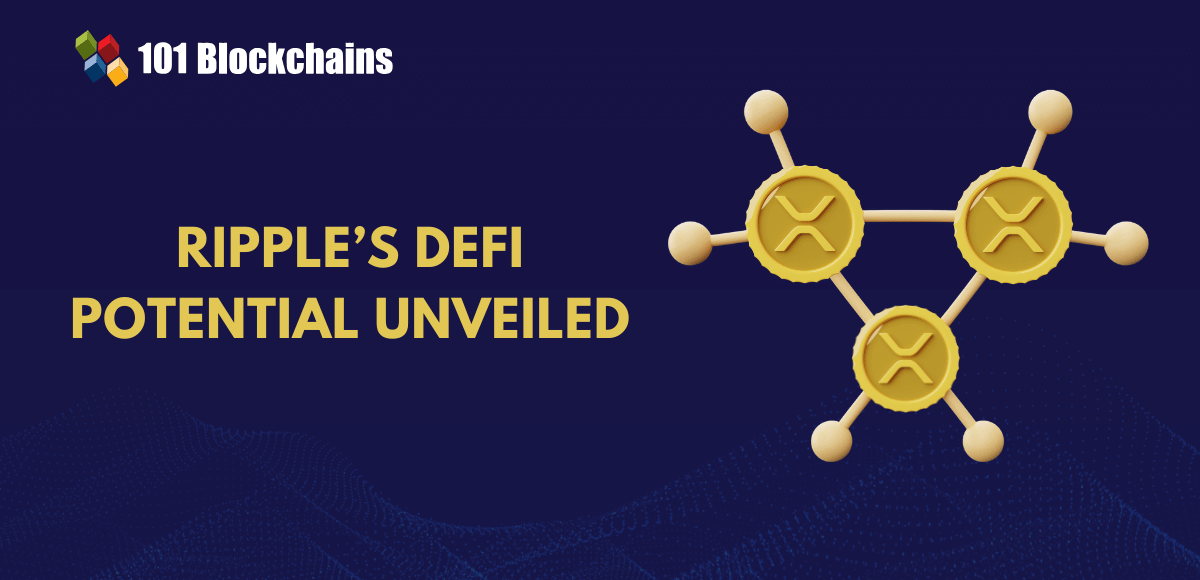Is Ripple the next big thing in DeFi?

Ripple is one of the notable names that comes up a lot in discussions about the cryptocurrency space. It is a famous technology company that created XRP Ledger, a public blockchain, and XRP, the native cryptocurrency of the blockchain. While news headlines talk about Ripple predictions for the next day, Ripple Labs has been actively involved in various initiatives. First of all, Ripple has collaborated with five governments and many others to create a CBDC pilot. Ripple provides trusted blockchain and tokenization solutions geared toward digital asset custody, CBDC, stablecoins, and cross-border payments. Let’s find out how Ripple could be the next big thing in DeFi.
Build your identity as a certified blockchain professional with 101 Blockchains’ blockchain certification, designed to provide enhanced career prospects.
Understanding the relationship between DeFi and Ripple
Ripple has become one of the leading contenders to become a big player in decentralized finance. It plays an important role in promoting DeFi through the critical tools and infrastructure facilities needed to develop new DeFi projects. We can see that XRP Ledger and Ripple Transaction Protocol (RTXP) have served as building blocks for various DeFi applications. Proponents of Ripple claim that the platform has made an outstanding contribution to the growth of the DeFi ecosystem.
Ripple Protocol Supports DeFi
Ripple uses the Ripple transaction protocol and the Ripple protocol consensus algorithm to transfer fiat and digital currencies across borders. This protocol has a distinct role to play in providing cost-effective and fast cross-border payments.
You can find a clear answer to the question ‘What is DeFi in Ripple?’ An open-source protocol that explores the capabilities of the Ripple Transaction Protocol to support cross-border payments using the XRP ledger. The RTXP protocol provides a unique consensus mechanism, IOU, route finding algorithm, and gateway. IOUs represent debt obligations between gateways and users and help facilitate transactions. Gateways are trusted currency exchange institutions that serve as entry and exit points for transactions within the Ripple network.
The Ripple Protocol consensus algorithm is a consensus process that uses the design of a practical Byzantine fault-tolerant algorithm. Nodes on the Ripple network that participate in the consensus process are validators. Validators are required to hold a certain amount of XRP tokens as a deposit to the network. It provides a more secure and lightweight consensus mechanism to support DeFi operations.
The most promising Ripple protocol that will play a significant role in the development of DeFi solutions is the Interledger Protocol (ILP). It is an open source protocol that supports transactions between various ledgers and payment networks. ILP utilizes various components such as connectors, conditional payments, cryptographic unlocking mechanisms, and routing protocols. This component serves as an ideal option for DeFi by ensuring interoperable, secure, and efficient transactions between various payment systems.
Want to learn more about DeFi protocols and their use cases? Enroll now in DeFi Intermediate Course
Ripple Reveals Why It Pursues DeFi Development
DeFi developers are likely to trust the Ripple blockchain for their DeFi development as it offers a variety of attractive benefits. An overview of why developers are choosing the XRP ledger for their DeFi projects can help you understand how Ripple will be the next big thing in DeFi.
The XRP ledger is public and decentralized with open source features that allow anyone to build on the ledger. The ledger is maintained by the Ripple community, which provides support to DeFi developers. Companies, validators, users, and developers in the Ripple community work together to enhance the XRP Ledger for DeFi.
Another promising characteristic of Ripple in supporting DeFi development is that it ensures streamlined development. You can see how the XRP Ledger encourages innovation through several projects emerging in the Ripple ecosystem. Additionally, Ripple provides a variety of tools with documentation to simplify development and speed up time to market.
The most exciting reason to build DeFi projects on Ripple’s XRP Ledger is because it guarantees better performance. Ripple has gained considerable popularity for faster transaction settlement within seconds. Ripple’s transaction speed is one of the reasons it is widely used for cross-border payments.
Enroll in our DeFi development course today to learn the best ways to use DeFi development tools like Solidity, React, and Hardhat.
Discovering the Usefulness of XRP Ledger in DeFi Development
XRP Ledger provides tools and targeted innovations to help speed development and accelerate time to market. It can serve as a valuable platform for creating various DeFi solutions. You should know about the notable tools provided by XRP Ledger to support DeFi development. XRP Ledger’s tools fall into two categories: infrastructure and developer tools. Infrastructure tools provide the basic foundation for creating DeFi solutions, while developer tools help add unique functionality.
-
Infrastructure tools on the XRP Ledger
DeFi Ripple connectivity can be clearly seen in the various infrastructure tools available on the XRP Ledger. Infrastructure tools such as Bithomp, Gatehub, XRP Toolkit, XRPL.org Ledger Explorer, OnTheDex, XRPL Rosetta, Towo Labs, and XRPScan. Each tool offers unique features to help you create efficient DeFi applications using Ripple.
Bithomp is a professional XRPL explorer and toolkit used by various cryptocurrency exchanges. It was created in 2015 with the goal of providing a user-friendly XRPL explorer.
Gatehub is also another explorer geared toward the XRP Ledger. It helps you track Gatehub’s issuance on the XRP Ledger.
XRP Toolkit provides a dedicated platform for managing crypto assets and trading activity on the XRP Ledger’s decentralized exchange.
XRPL.org Ledger Explorer is the native block explorer for the XRP Ledger that can provide transparency to DeFi apps.
OnTheDex serves as a reliable source of information for a live feed of XRPL token activity. We provide information about XRPL token activity to other aggregator sites.
XRPL Rosetta provides promising infrastructure tools for creating DeFi apps that can provide visualizations of fiat data on the XRP Ledger.
Towo Labs is also an important infrastructure provider helping develop the XRP Ledger and Interledger infrastructure. It primarily focuses on simplifying non-custodial cryptocurrency management.
XRPScan is an explorer and analysis platform built specifically for the XRP Ledger. The platform provides a simple and transparent approach to view information about your accounts, transactions, and ledgers.
-
Developer Tools on XRP Ledger
Ripple’s involvement in decentralized finance has also become clear due to the XRP Ledger’s developer tools capabilities. You can find tools like those from Cryptum, Evernode, X-Tokenize, and 3ZY Labs. Let’s find out what each tool offers for DeFi projects.
Cryptum is a powerful API/SDK platform that enables DeFi development by supporting the integration of any application with the XRP Ledger.
X-Tokenize serves as a powerful command-line tool that can ensure a simpler process for developing, managing, and deploying tokens on the XRP Ledger. We also plan to introduce facilities to create and distribute NFTs on XRPL.
Evernode has emerged as a powerful resource for DeFi development. It is a scalable, permissionless layer 2 smart contract network developed on the XRP Ledger. Evernode’s most important feature is its flexibility, which is essential for DeFi solutions.
The most interesting player offering developer tools on the XRP Ledger is 3ZY Labs. To improve the user experience of DeFi, we have developed a SaaS solution that combines web2 and web3 technologies and marketing. The platform plays a critical role in ensuring safe and trustless DeFi transactions on the XRP Ledger.
Through the Blockchain Developer career path, you can become a highly skilled blockchain developer and create new, high-level, innovative blockchain solutions for a variety of industries.
Provides a powerful decentralized exchange
The XRP Ledger stands out as a promising platform for DeFi development as it leverages the capabilities of the world’s oldest decentralized exchange. It is important to note that the DEX has been functioning continuously since the launch of the XRP Ledger. This exchange serves as a proof for Ripple predictions regarding DeFi developments. Decentralized exchanges help you buy and sell cryptocurrency tokens with minimal fees, which works perfectly for DeFi solutions. It is important to note that the XRP Ledger’s decentralized exchange includes multiple currency pairs. DEXs also provide transparency through on-demand tracking when users need to place a trade.
Another notable feature of the XRP Ledger that supports DeFi development is its cross-currency payment functionality. Cross-currency payments on the XRP Ledger provide a compelling reason to drive DeFi activity. It is also important to note that cross-currency payments on the XRP Ledger can offer variable amounts within certain transfer limits.
final thoughts
Using Ripple for DeFi application development will focus on algorithmic trading, decentralized exchanges, and tool facilities. It is important to note that the Ripple blockchain provides infrastructure and developer tools along with the XRP Ledger along with a decentralized exchange to support DeFi activities. It is also important to mention the benefits of XRP Ledger for developers, such as faster transactions, open source development, and a dedicated community.
As speculation about XRP Ledger’s involvement in CBDC development continues to gain momentum, DeFi developers may be exploring the opportunity. The capabilities of the tools provided by XRP Ledger prove that Ripple is a strong contender for developing DeFi solutions. Learn more insights into the features of Ripple, which makes it a good choice for DeFi development right now.

*Disclaimer: This article should not be considered, and is not intended to provide, investment advice. The statements made in this article are not investment advice and should not be taken as such. 101 Blockchain is not responsible for any loss suffered by anyone relying on this document. Do your own research!



